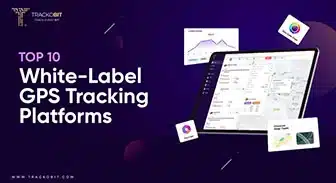-
TrackoBit
Manage commercial vehicles with the new-age Fleet Management Software
TrackoBit -
TrackoField
Streamline your scattered workforce with Field Force Management Software
TrackoField -
Features Resources
-
Blog
Carefully curated articles to update you on industrial trends. -
White Paper
Insightful papers and analysis on essential subject matters. -
Glossary
Explore an alphabetical list of relevant industry terms. -
What’s New
Get TrackoBit & TrackoField monthly updates here. -
Case Study
Explore the cases we solved with our diverse solutions. -
Comparisons
Compare platforms, features, and pricing to find your best fit.
-
About Us
Get to know TrackoBit: our team, ethos, values, and vision. -
Careers
Join the most dynamic cult of coders, creatives and changemakers. -
Tech Support
Learn about our technical support team and services in detail. -
Events
Check out the exhibitions where we left our marks and conquered. -
Contact Us
Connect with us and let us know how we can be of service.
Are Nuclear Verdicts Poisoning the Trucking Industry?
- Author:Ayushi Nagalia
- Read Time:8 min
- Published:
- Last Update: November 9, 2023
Table of Contents
Toggle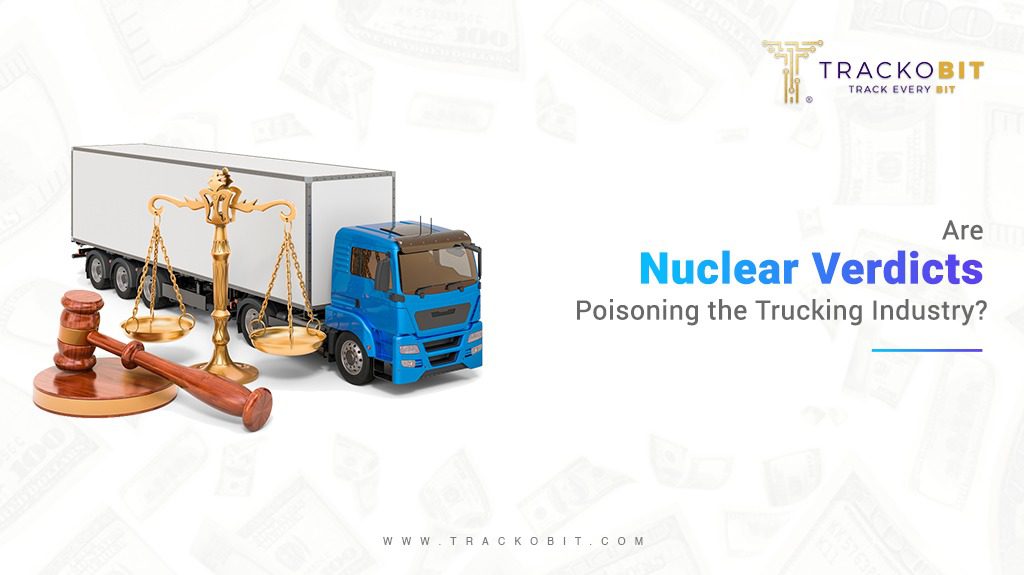
Imagine. You put all your savings and efforts into a business in a high-risk industry. Both profits and expenses are volatile. Everything is going well and you have managed to build a million-dollar company.
Table of Contents
Toggle
One day, you get a call about a mishappening. Nothing new, something businesses in your industry have to face every day.
This particular incident was different though. What you didn’t know during that call was that you’ll soon be in the courtroom. You’d be witnessing your company getting such a big jury penalty that it has to go under.
Sounds devastating, right? Well, unfortunately, this has been the reality for several business owners, especially in the trucking industry. The industry is bombarded by the deadly ‘nuclear verdicts’ and we’re here to break it down for you.
What Are Nuclear Verdicts?
Any verdict that involves a jury award of $10 million or more is a nuclear verdict.
Nuclear verdicts aren’t and have never been justifiable or fair. They are disproportionate responses to a situation. So disproportionate that the compensation far exceeds any rationality and can only be justified by inadequate measures.
The first nuclear verdict was observed in 1994 when selling scalding coffee landed the barista a penalty of $2.7 million. However, after the phenomenal penalty of $80 million against Walmart truck drivers, the trucking industry has become the centrepiece of nuclear verdicts.
The penalty prices for the trucking industry are so bad that the average verdict against trucking companies was 2.6 million in 2012. However, in 2019, this number went up to $17 million.
With such huge amounts, nuclear verdicts are essentially weapons to kill a company. Many trucking companies have to file for bankruptcy because of a hefty nuclear verdict; maybe that is why they are named so apocalyptically.
The Litigation Noose Tightens For Truckers
Sure, nuclear verdicts exist for every industry. But in the last 5 years, nuclear verdicts in the trucking industry have gone up by 300%. And this is with a 60% reduction in road-crash deaths as a proportion of the increase in highway miles traveled.
The highways are getting safer but the lawsuits against truck companies are doubling. The industry is in a troubled loop wherein nuclear verdicts make insurance difficult and bad insurance leads to nuclear verdicts.
High Insurance Rates for Trucking Companies
There has been a major rise in nuclear verdicts in the trucking industry. Therefore, insurance companies have started to be careful with their clients. After all, just one nuclear verdict and the insurance company will run out of profits, right?
Therefore, insurance companies have either stopped catering to trucking companies or charge them hefty premiums. They need to be earning more from these companies so that they can pay higher settlement costs.
Because of this, either some companies are not even properly insured, or some find it difficult to survive with the heavy expenditure they have to make just to stay afloat.
Quicker Settlements
Insurers are skeptical of having a case for a trucking company go to court and in front of a jury. Most verdicts turn nuclear because of the emotional titillation of the jury. Therefore, if a truck accident goes to the courtroom, there is a high possibility of getting the worst results.
Most insurers resultingly get in a hurry to settle cases instead of going about the system. Settlements, however, are not cheap either, especially when the driver is not even at fault. Logically, if a case goes to the jury, it is more likely to get a smaller penalty, but that is not the case with the trucking industry anymore.
Because of the excessive settlements, only 5% of crash cases that do go to the jury are the grave ones. In these cases, the plaintiff wants more than just money. Their loss can only be justified with a nuclear verdict. And when most of the cases that go to the jury are such, a negative environment for truckers forms.
A Negative Social Environment
The trucking industry goes down the legislative vortex because of social negativity against it. The following are stigma against trucks and the trucking industry that don’t let them get out of the legislative vortex:
- In a collision between a truck and a domestic vehicle, the truck driver would always be considered to be the one at fault.
- Most truck drivers are either intoxicated or drowsy and hence, are unfit to inhabit highways.
- Trucks on the roads are the biggest reason for highway fatalities
- An array of advertisements for attornies promoting anti-trucking sentiments
Plaintiffs Using The Reptile Theory
As mentioned earlier, nuclear verdicts are essentially an overreaction to a trucking incident that is often motivated by emotions. Therefore, one of the strongest plaintiff strategies against trucking companies is using The Reptile Theory.
Through this strategy, the plaintiff essentially moulds the trial in a way to activate the jury’s survival instinct. Therefore, they look at the case from a more subjective than objective point of view. As a byproduct of this, jurors feel threatened by their genes and the community and award pressing penalties.
There’s a Lot At Stake: Effects of Nuclear Verdicts
Nuclear verdicts against trucking companies are not only a legislative problem. It is a holistic problem that affects all sectors of society in general. Let’s see how.
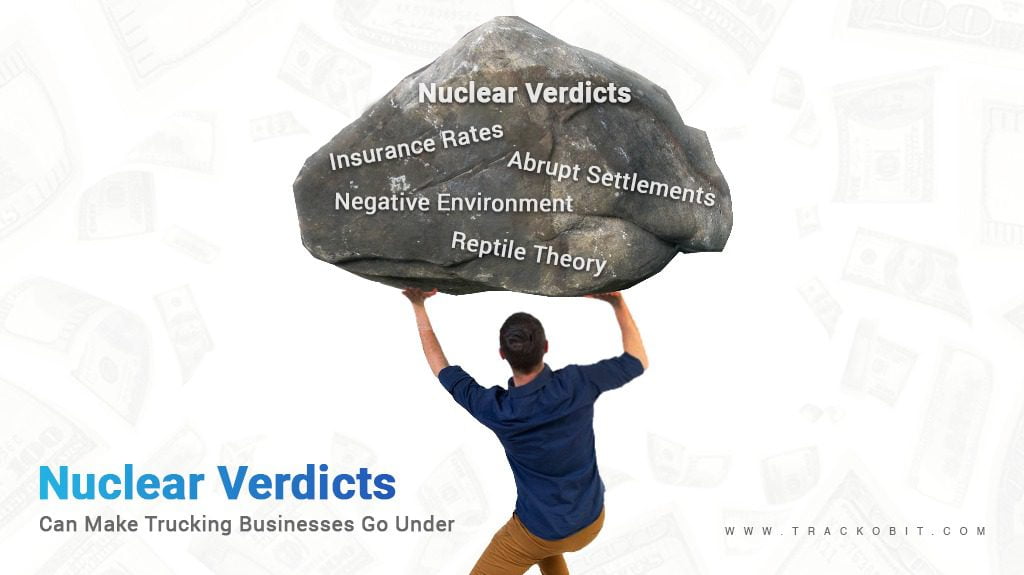
Harming National Logistics
The trucking industry accounts for 43% of the total global logistics. Life in any country would not be as simple without the trucking industry, transporting even necessities such as vegetables. A major connecting point between multiple international modes of transportation would also disappear without trucks.
Disturbed Economy
If trucking companies have to continue paying extremely high premiums for insurance or hefty penalties, the entire economy will get disturbed. How? Because trucking companies will have to increase their service costs to accommodate the excessive operational costs. These increased service costs will in return lead to increased commodity prices.
Businesses Shutting Down
A nuclear verdict often leads to trucking companies failing since most businesses don’t have so much money available at ease. Even if the business can somehow pay off the penalty, they will have bad enough credibility to either not get business or drivers, eventually forcing them to shut down.
Discouraging Small Businesses
Only the big and extremely strongly established companies can withstand a nuclear verdict. Most mom-and-pop businesses will have to declare bankruptcy to recover from a nuclear verdict. This majorly discourages small businesses from functioning or even existing, something that is not good for the economy and society.
How To Prevent Your Fleet From Nuclear Verdicts
Nuclear verdicts against the trucking industry depend on a lack of evidence. Since the jury cannot see some crucial insights that determine who was responsible for the accident, they are likely to condemn the truck driver.
The two major problems that lead to nuclear verdicts and high insurance claims are the:
- Lack of driving data
- Lack of security equipment
Both these problems can be easily solved with telematics software or a fleet management software system. Here’s how:
Video Telematics
Installing dashcams is the most effective way to prevent nuclear verdicts. With dashcam footage, it becomes evident who was at fault in the collision. This absolves drivers from multiple cases where they were innocent but could have easily been blamed.
Video telematics systems prevent nuclear verdicts and also help reduce insurance premiums. The better the safety measures, the lower the chances of getting into trouble, right?
Trucking industries can use video telematics in the following ways:
- Installing dashcams for road video to check how a front collision happened
- Facing dashcams towards the cabin to see what the drivers are up to – whether they’re alert or not
- Installing side and back dashcams to check who was responsible for other collisions
- Using AI systems to help fleet managers know if a collision is about to happen or if a driver is losing focus for whatever reason
Driver Safety Assessments
Maintaining driver safety assessments is paramount in winning court cases in the trucking industry. Trucking companies can use video telematics to check the drivers’ attention levels or can even use sensor reports to check how well and safely they drive the vehicles.
Cumulative driving scores and reports help understand the drivers’ credibility. This metric can also prove incredibly useful in understanding if the trucking company and driver are reliable.
Engine Diagnostics and Maintenance Data
Driver attention is not the only reason for fatal accidents. If the engine is not doing well, it can break down at any time and hence, lead to a collision on the highway. Other issues such as tyre wear and tear can also lead to accidents.
By maintaining engine and maintenance data, trucking companies can answer pressing questions such as:
- When a piece of equipment seems to be going bad, is the problem addressed right away?
- Does someone else have to report these issues to get the parts repaired or replaced?
Such questions are important in cases involving trucking nuclear verdicts because they show how active the management is. The better the management, the more a single case can be treated as a mistake instead of a pressing crime against society.
Compliance Checks
The lack of compliance and negligence are the biggest reasons juries decide to give nuclear verdicts. However, you can use AI and a fleet management software system to ensure that drivers and vehicles are completely compliant with all rules and regulations.
The right fleet management software alert managers when any regulation is not being followed. Therefore, they can ensure that the problem is solved before it leads to a collision or a reason to blame during a trial.
What Does the Future Hold?
The current insurance, legal, economic, and logistics infrastructure does not favour the trucking industry. However, economies are largely dependent on roads and hence, would crumble without trucking.
To sustain logistics, the future will have to be free of unnecessary nuclear verdicts.
While businesses can personally implement telematics, legislations need to take a step as well. Insurance companies need to be regulated and there should be limits to the penalties for the nature of accidents.
The future is sure to be a better-connected one with higher data transparency and availability due to telematics systems like TrackoBit. It will also have faster courtroom decisions and better driver safety and retention in a fleet due to the records in fleet management software.
Ayushi Nagalia is a Senior Content Specialist at TrackoBit. She is a marketing maverick with a lush background in literature. With years of experience crafting content for various niches, she speciali... Read More
Related Blogs
-
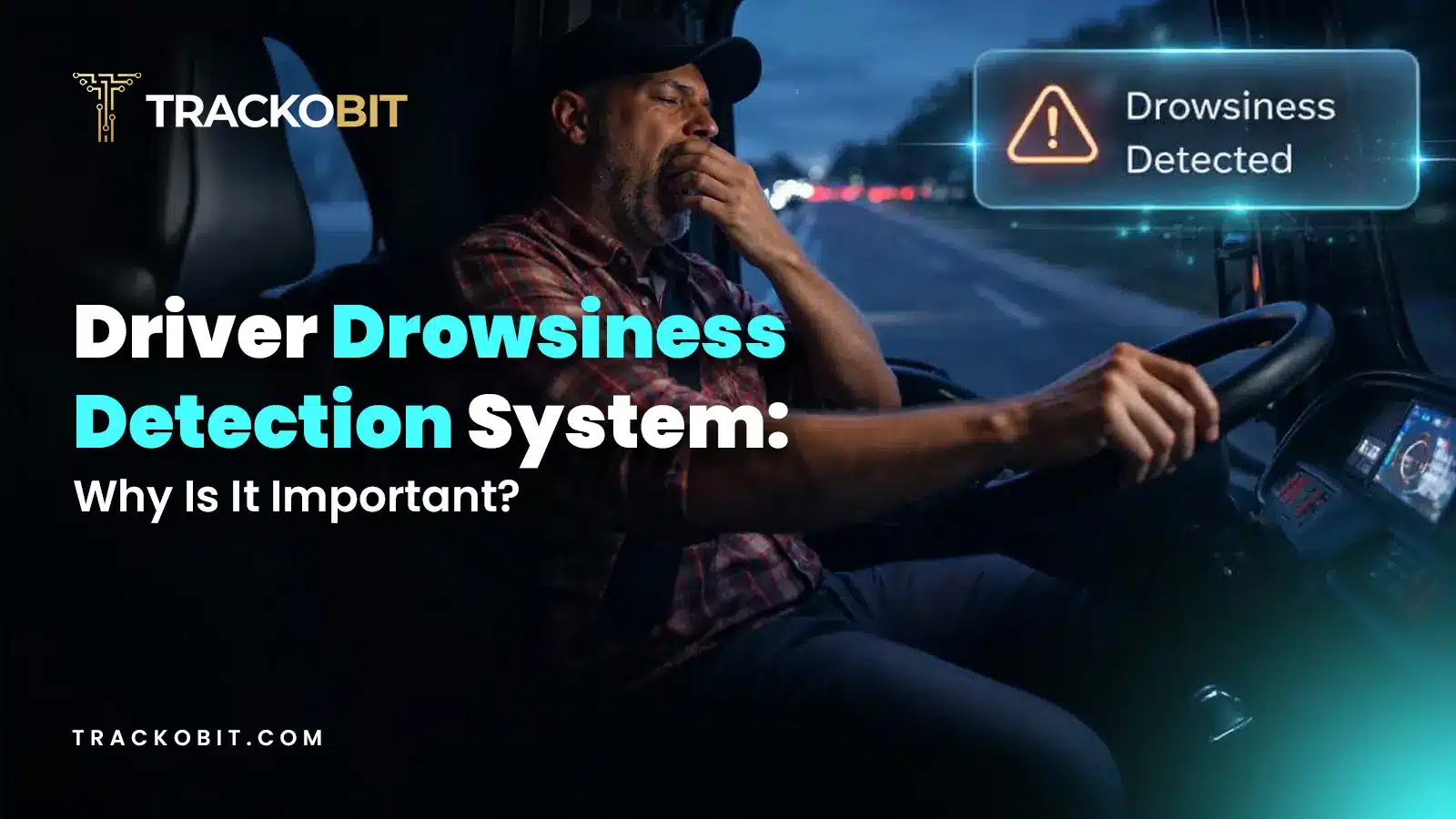
Why is Driver Drowsiness Detection System Important for Fleet Management?
Shemanti Ghosh February 4, 2026A driver drowsiness detection system is critical for fleet management. It helps prevent fatigue-related accidents and reduces operational risks through…
-
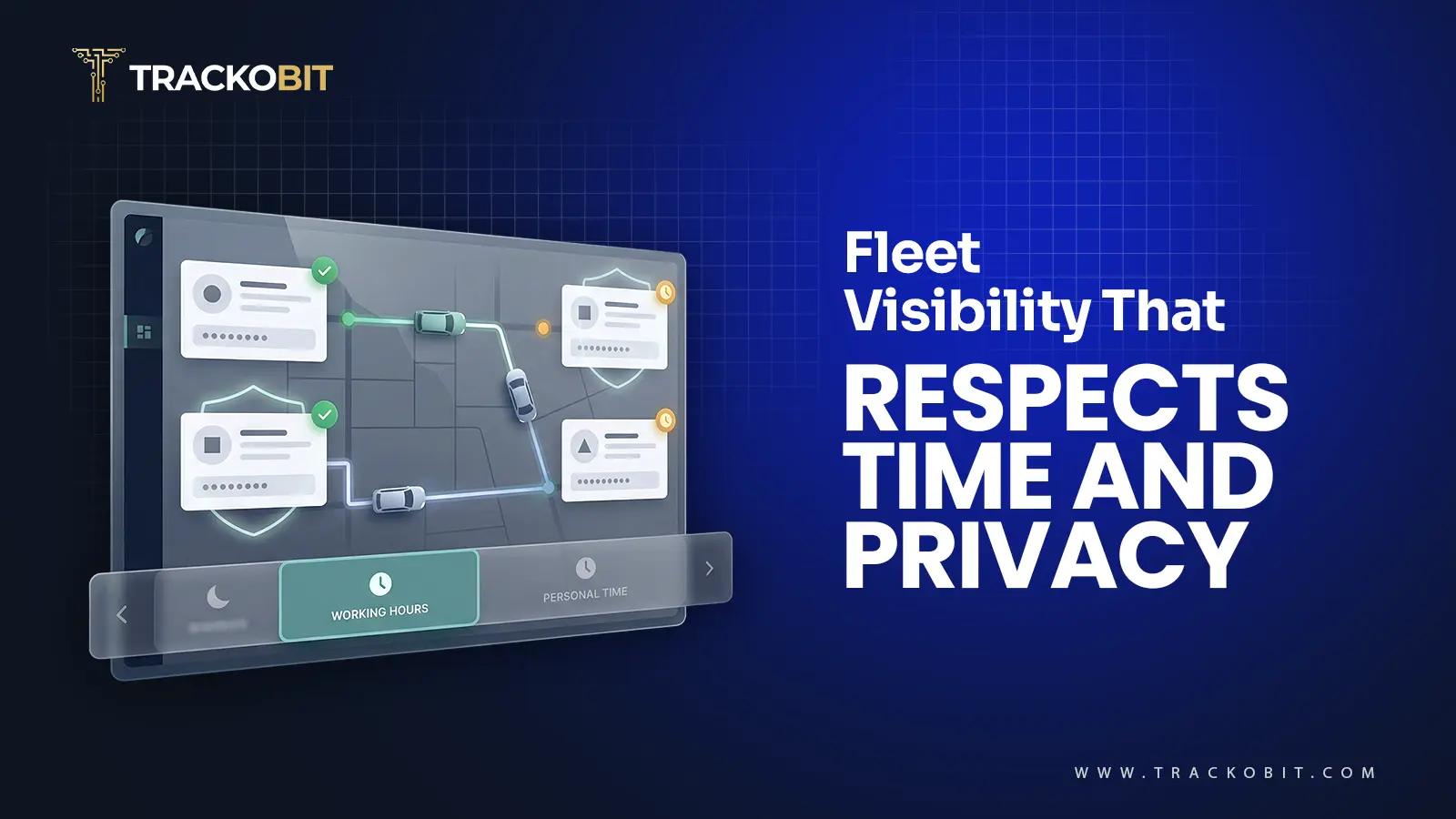
When Tracking Needs a Clock: Rethinking Fleet Visibility
Tithi Agarwal December 24, 2025Read on to understand why fleet tracking works better when it follows working hours. Because visibility should support operations, not…
-
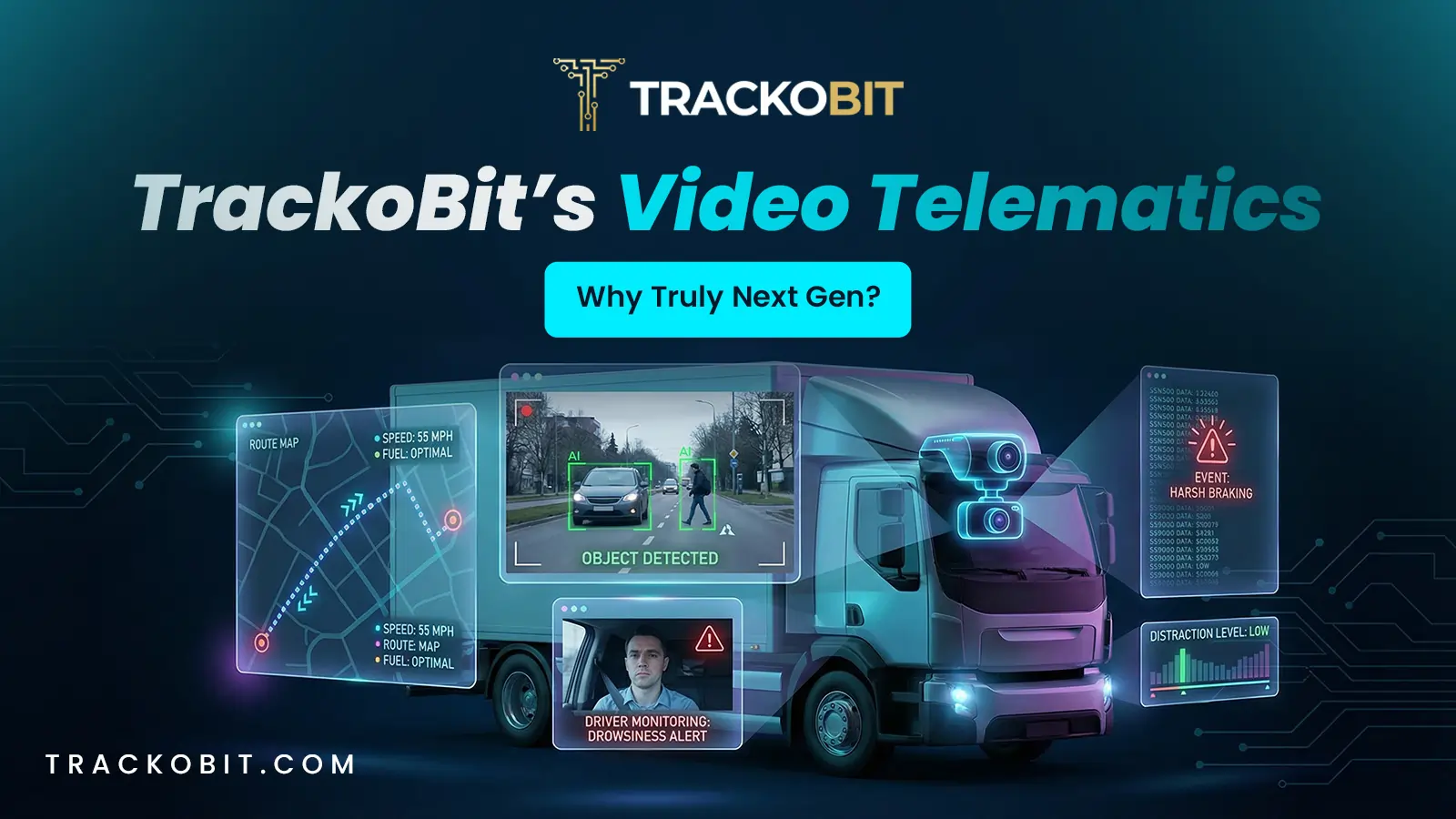
What Makes TrackoBit’s Video Telematics Software Truly Next-Gen?
Shemanti Ghosh December 17, 2025TrackoBit’s video telematics software blends smart video intelligence with full server control. The result? Superior fleet reliability and safety.
-
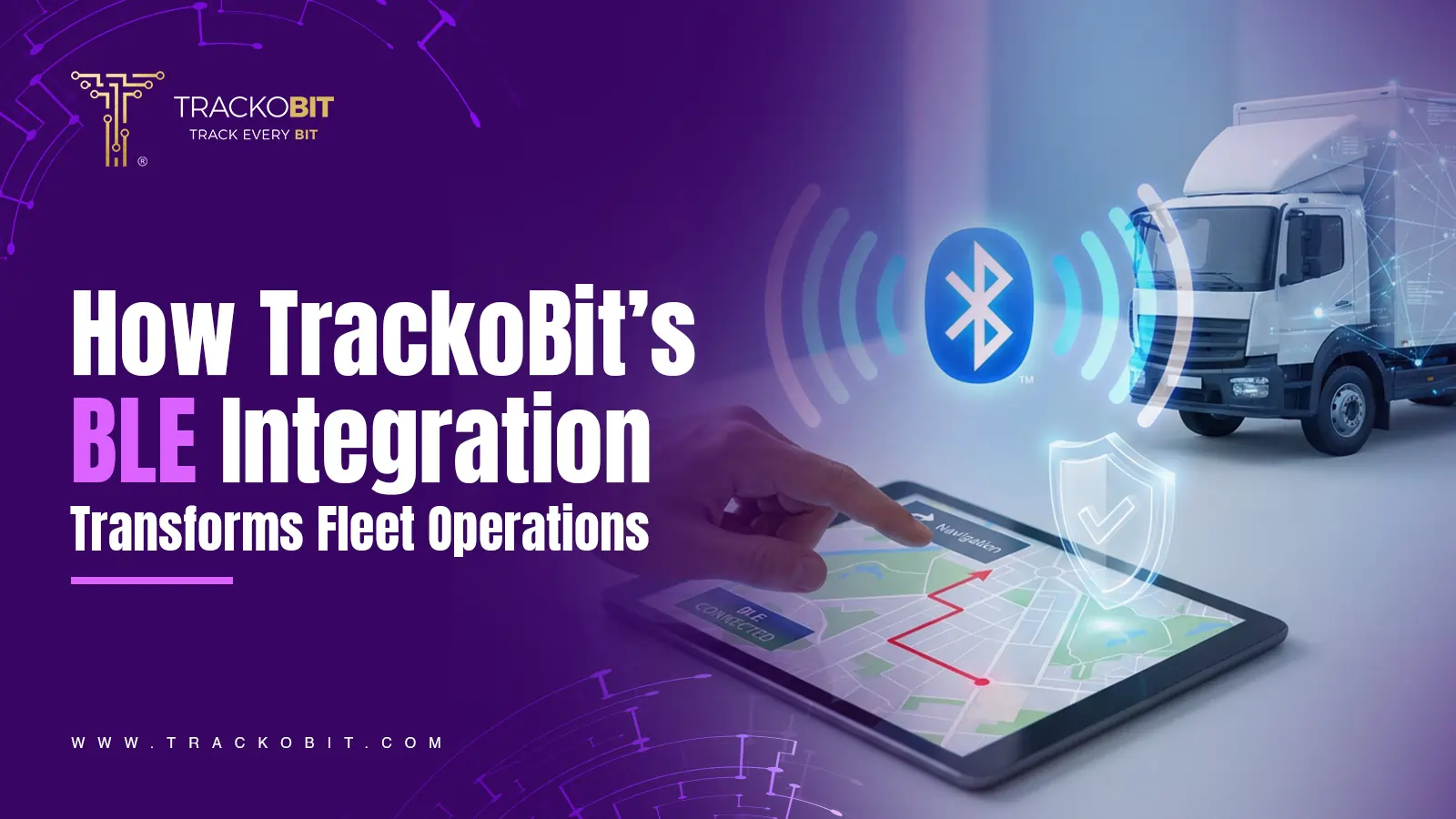
Plug, Pair, Perform TrackoBit Introduces BLE Sensor Integration
Tithi Agarwal November 26, 2025TrackoBit’s BLE Sensor Integration enables wireless, real-time monitoring with faster installs and accurate insights. It improves fleet efficiency, visibility, and…

Subscribe for weekly tips to optimize your fleet’s potential!
Your inbox awaits a welcome email. Stay tuned for the latest blog updates & expert insights.
"While you're here, dive into some more reads or grab quick bites from our social platforms!"Stay Updated on tech, telematics and mobility. Don't miss out on the latest in the industry.
We use cookies to enhance and personalize your browsing experience. By continuing to use our website, you agree to our Privacy Policy.



































